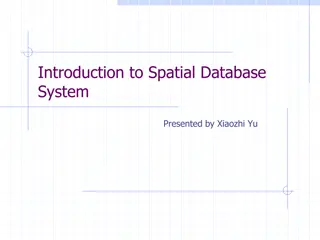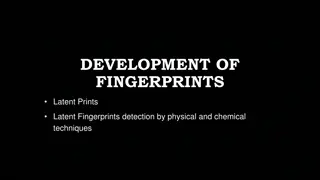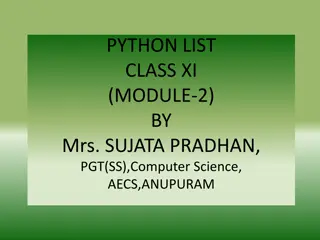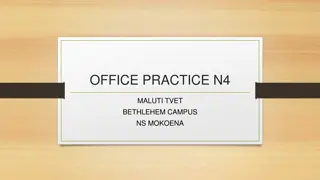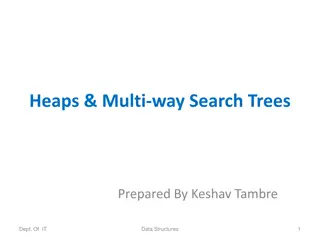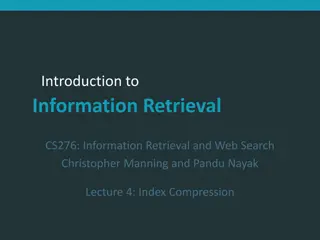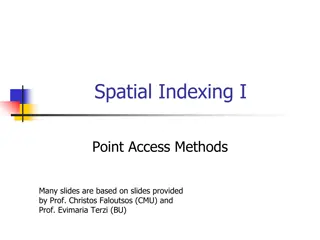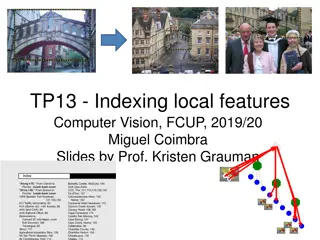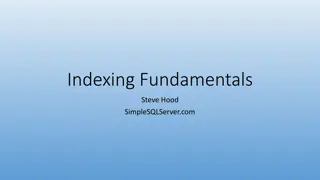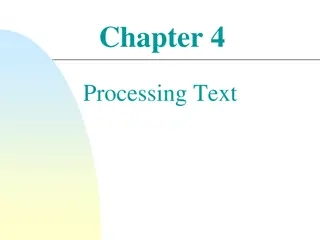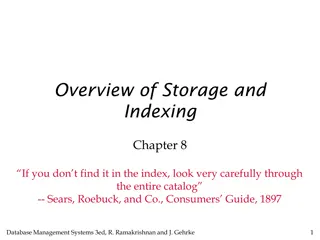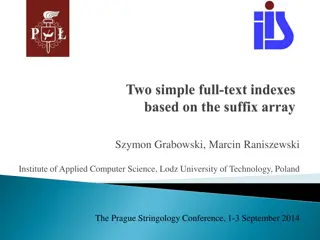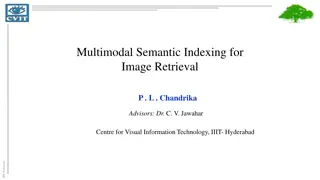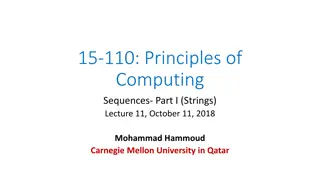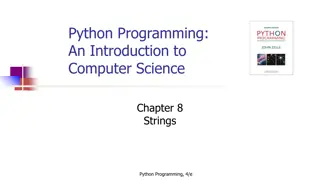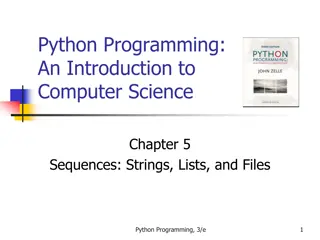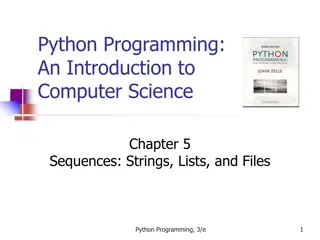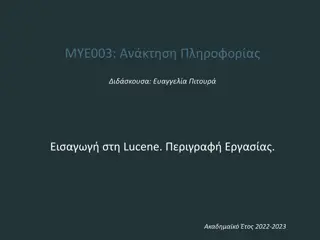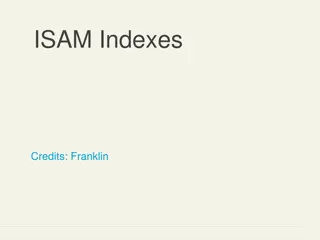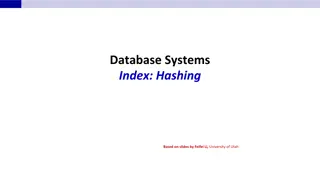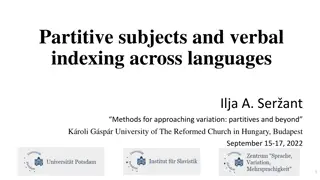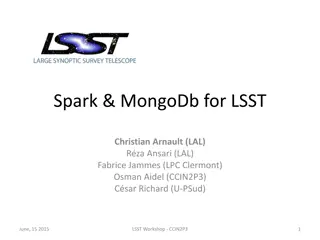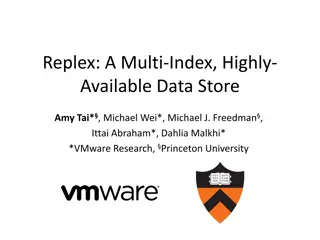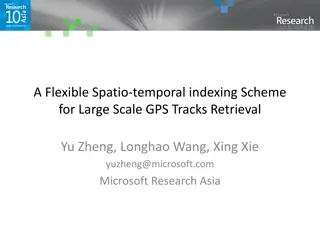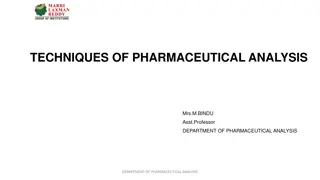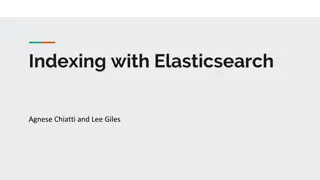Understanding Indexing: Key Concepts and Methods
Indexing plays a crucial role in organizing and retrieving information efficiently. It simplifies data, enhances accuracy, and enables quick access. This comprehensive guide explores the concept of indexing, different methods like pre-coordinate and post-coordinate indexing, factors affecting indexi
1 views • 18 slides
Exploring the impact of automated indexing on completeness of MeSH terms
This study delves into the effects of automated indexing on the thoroughness of MeSH terms. It addresses the novelty of automated indexing, its implications for teaching, questions raised by students, observed missing index terms, and the significance of MeSH in practice. The explanation of how auto
4 views • 33 slides
Understanding Spatial Database Systems: An Overview
This presentation by Xiaozhi Yu introduces the fundamentals of spatial database systems, covering topics such as spatial data types, relationships, system architecture, modeling, and organizing underlying spaces. It delves into the importance of integrating geometry into DBMS data models, spatial in
1 views • 30 slides
Understanding Fingerprint Development Techniques
Exploring the development of latent fingerprints through physical and chemical methods, conditions affecting latent prints, and various fingerprint development techniques like visual examination, powder techniques, and chemical techniques. Techniques such as alternate light sources and powder method
2 views • 22 slides
Python List Operations and Usage in Programming
Lists in Python are versatile data structures that allow storing an ordered sequence of items. This article covers the basics of lists, key operations such as indexing, slicing, concatenation, repetition, membership checks, and traversing lists using loops. Understanding these fundamental concepts i
1 views • 14 slides
Qualitative Data Analysis Techniques in Research
The purpose of data analysis is to organize, structure, and derive meaning from research data. Qualitative analysis involves insight, creativity, and hard work. Researchers play a crucial role as instruments for data analysis, exploring and reflecting on interview discussions. Steps include transcri
1 views • 27 slides
Efficient Office Document Management Practices
Explore the key aspects of office document management, including filing and indexing systems, classification of records, steps in the record cycle, and the functions of filing and indexing. Learn how to organize, store, retrieve, and dispose of documents effectively to ensure operational efficiency.
1 views • 26 slides
Understanding Heaps and Multi-way Search Trees
Explore the concepts of heaps, types of heaps, and their applications, along with the implementation of different heaps and indexing techniques. Learn about the differences between B-trees and B+-trees in the context of data structures.
0 views • 60 slides
Introduction to Information Retrieval: Compression Techniques and Index Optimization
Exploring concepts from information retrieval, this content delves into index compression methods such as blocked sort-based indexing and single-pass in-memory indexing. It discusses the importance of compression for inverted indexes to optimize memory usage and decrease disk space requirements, ult
2 views • 50 slides
Advanced Tools for Text Indexing and Searching in SQL and Lucene
Explore advanced techniques for text indexing and searching using SQL statements like CREATE INDEX and FULLTEXT INDEX, along with insights into popular search engines such as Lucene, Sphinx, and Thinking Sphinx. Dive into the comparison between Lucene and Sphinx, and discover how tools like Sphinx S
0 views • 13 slides
Efficient Spatial Indexing Techniques for Range Queries
Explore spatial indexing methods such as grid file, kd-tree, and quadtrees for efficient range query processing. Learn how these methods partition space, handle multidimensional points, and optimize disk access. Discover the implementation details and search strategies for exact match and range quer
1 views • 56 slides
Local Features in Computer Vision - Slides by Prof. Kristen Grauman
This collection of slides by Prof. Kristen Grauman covers topics related to indexing and matching local features in computer vision. It discusses methods for generating candidate matches, constraining matches in stereo cases, and efficiently finding relevant features in a large database. The importa
1 views • 43 slides
Understanding Indexing Fundamentals in Simple SQL Server
Explore the basics of indexing in SQL Server with a focus on clustered and nonclustered index types, their uses, costs, & optimization. Learn the importance of SARGable queries, execution plans, and how indexes impact database performance.
2 views • 26 slides
Text Processing: Indexing, Zipf's Law, and Vocabulary Growth
Processing text involves converting documents into index terms, addressing issues like word variations, indexing text and metadata, understanding word frequency distribution with Zipf's Law, and predicting vocabulary growth with Heaps' Law.
0 views • 30 slides
Storage and Indexing Overview in Database Management Systems
The chapter on storage and indexing covers various aspects such as data retrieval from external storage disks and tapes, file organizations like heap files and sorted files, as well as the importance and structure of indexes in speeding up data retrievals. It delves into B+ Tree indexes and their or
1 views • 33 slides
Efficient Billion-Scale Label-Constrained Reachability Queries
Graph data sets are prevalent in various domains like social networks and biological networks. Label-Constrained Reachability (LCR) queries aim to determine if a vertex can reach another vertex through specific labeled edges. Existing works utilize exhaustive search or graph indexing techniques, but
0 views • 13 slides
Efficient Data Lookup and Indexing Techniques in Systems
This content delves into advanced indexing methods for optimized data lookup in systems. It discusses linear and binary search algorithms, data structures for efficient lookups, the concept of learned indexes, and challenges to implementing learned indexes. It also introduces Bourbon, a learned inde
1 views • 16 slides
Understanding Search Engines and SEO Techniques
Search engines like Google use web crawlers to index web content, which is then ranked based on relevance to user searches. Search Engine Optimization (SEO) techniques help websites rank higher by optimizing content for key words. SEO process involves crawling, indexing, and ranking to improve visib
0 views • 9 slides
Advances in Full-Text Indexing Using Suffix Arrays
Explore the evolution of full-text indexing techniques leveraging suffix arrays, from SA-hash to FBCSA, with insights on experimental results, suffix trees, and compressed indexes like CSA and FM-index. Discover efficient search strategies and data structures for pattern matching in text processing.
1 views • 28 slides
Multimodal Semantic Indexing for Image Retrieval at IIIT Hyderabad
This research delves into multimodal semantic indexing methods for image retrieval, focusing on extending Latent Semantic Indexing (LSI) and probabilistic LSI to a multi-modal setting. Contributions include the refinement of graph models and partitioning algorithms to enhance image retrieval from tr
1 views • 28 slides
Understanding String Indexing and Slicing in Python
Python strings are sequences of characters that can be accessed using indexing and slicing. Indexing allows you to access individual characters in a string using numerical positions, starting from 0. Slicing enables you to extract a portion of a string by specifying a range of indices. Understanding
0 views • 26 slides
Introduction to Python Strings and Basic Operations
Python Programming introduces the string data type, representing text in programs as a sequence of characters enclosed in quotation marks. This chapter covers operations on strings using built-in functions and methods, sequences and indexing in Python strings and lists, string formatting, cryptograp
0 views • 67 slides
Introduction to Python Programming: Strings, Lists, and Files
This chapter delves into the fundamental concepts of Python programming related to sequences, specifically focusing on strings, lists, and file processing. It covers the representation of strings, various operations that can be performed on them, basic ideas of sequences and indexing for strings and
0 views • 109 slides
Understanding Python Programming: Strings, Lists, and Files in Computer Science
This chapter delves into the fundamentals of Python programming, focusing on sequences like strings, lists, and files. You will discover how strings are represented, explore operations on them, including built-in functions and methods. The text covers the basics of sequences, indexing, string format
0 views • 109 slides
Mastering Array Selection and Indexing in Data Processing
Unlock the power of array selection and indexing techniques through a series of educational slides. Explore different methods for selecting elements from arrays and dive into various indexing strategies, suitable for beginners and experienced professionals alike. Gain insights into cell structures,
1 views • 70 slides
Understanding Lucene: A Comprehensive Overview of a Powerful Search Software
Lucene is an open-source search software library that provides Java-based indexing and search capabilities, spellchecking, hit highlighting, and advanced analysis/tokenization features. Used by major companies like LinkedIn, Twitter, Netflix, and more, Lucene is known for its scalability, high-perfo
0 views • 58 slides
Understanding ISAM Indexes and Tree-Structured Indexing Techniques
This content delves into the concepts of ISAM (Indexed Sequential Access Method) indexes and tree-structured indexing techniques used in database management. It explores the differences between ISAM and B+ trees, the implementation of sparse and dense indexes, and the structure of ISAM tree indexes.
0 views • 12 slides
Understanding Database Index Hashing Techniques
Hashing-based indexing in database systems is efficient for equality selections but not suitable for range searches. Both static and dynamic hashing methods exist, with static hashing involving fixed primary pages that are allocated sequentially. The process involves determining the bucket to which
0 views • 41 slides
Geospatial Video Search and Viewable Scene Modeling
Explore the innovative research on georeferenced video search and viewable scene modeling. Learn about automatic annotation, camera direction modeling, data acquisition, and indexing for enhanced video retrieval. The study focuses on capturing the field-of-view, meta-data acquisition, and synchroniz
0 views • 15 slides
Understanding Partitives and Verbal Indexing in Language
Partitives are grammatical constructions used to encode true-partitive relations, involving quantifiers and restrictors. They can also express plain quantification. Verbs may vary in indexing within partitives. Pseudo-partitives and true partitives exemplify how partitive constructions work. This st
0 views • 31 slides
Understanding Fingerprint Development Techniques
Latent fingerprints are hidden impressions left by the friction ridges of the skin which require physical or chemical techniques for visualization. Factors affecting latent prints include surface type, touch manner, weather, humidity, perspiration, and suspect care. Techniques such as visual examina
0 views • 22 slides
Semi-Indexing Semi-Structured Data in Tiny Space by Giuseppe Ottaviano and Roberto Grossi
This article discusses the concept of semi-indexing for semi-structured data in limited space, presented by Giuseppe Ottaviano and Roberto Grossi from the University of Pisa. The study explores efficient data organization techniques to optimize storage and access for structured information.
0 views • 19 slides
Spark & MongoDB Integration for LSST Workshop
Explore the use of Spark and MongoDB for processing workflows in the LSST workshop, focusing on parallelism, distribution, intermediate data handling, data management, and distribution methods. Learn about converting data formats, utilizing GeoSpark for 2D indexing, and comparing features with QServ
0 views • 22 slides
Exploring NoSQL Database Scalability Using Indexing Techniques
Dive into the world of NoSQL database scalability by understanding how indexing enables richer queries and how local indexing impacts partitioning, updates, and lookups across distributed databases.
0 views • 59 slides
String Manipulation in Java: Operations, Indexing, and Methods
The class String in Java provides operations to manipulate strings, where a string is a sequence of characters enclosed in double quotation marks. String operations include indexing, determining string length, concatenation, and various methods such as indexOf, substring, toLowerCase, and toUpperCas
0 views • 17 slides
Flexible Spatio-temporal Indexing Scheme for Large Scale GPS Tracks Retrieval
This research paper discusses a novel spatio-temporal indexing scheme optimized for managing large-scale GPS data. The study introduces a stochastic process model to simulate user behavior in uploading GPS tracks, leading to a more efficient indexing scheme with smaller size, minimal update efforts,
0 views • 24 slides
Analytical Techniques in Pharmaceutical Analysis
Analytical techniques play a crucial role in determining the identification and concentration of chemical substances in pharmaceutical analysis. Techniques range from simple gravimetric analysis to sophisticated methods using specialized instrumentation. Various techniques like gravimetric, titrimet
0 views • 17 slides
Enhancing Arabic Search and Web Visibility for Libraries
Naseej offers innovative solutions for Arabic searching, indexing, and web visibility in libraries. By focusing on high recall and precision, Naseej Smart Arabic Processor and unique indexing techniques cater to the specific needs of Arabic language handling. The integration of Library Link Network
0 views • 10 slides
Microscopic Techniques in Cell Biology: Lessons and Labs Overview
Explore the fascinating world of optical microscopy in cellular biology, covering topics such as image formation, contrasting techniques, fluorescence microscopy, live-imaging techniques, and quantitative microscopy. Dive into the principles behind various microscopy techniques and experimental labs
0 views • 7 slides
Comprehensive Guide to Elasticsearch Indexing and Retrieval
Learn how to index, retrieve, and preprocess content with Elasticsearch. Explore techniques such as crawling with Heritrix, accessing Kibana, defining text preprocessing, testing Lucene analyzers, using file system (FS) crawler for indexing, and configuring FS crawler for efficient data ingestion in
0 views • 10 slides


